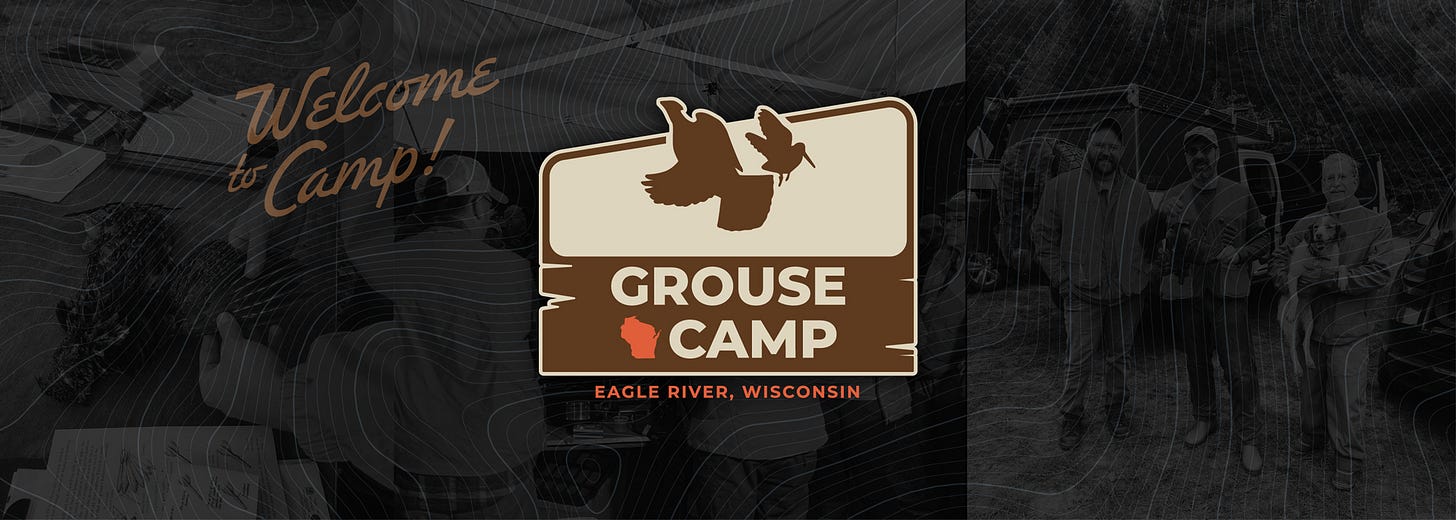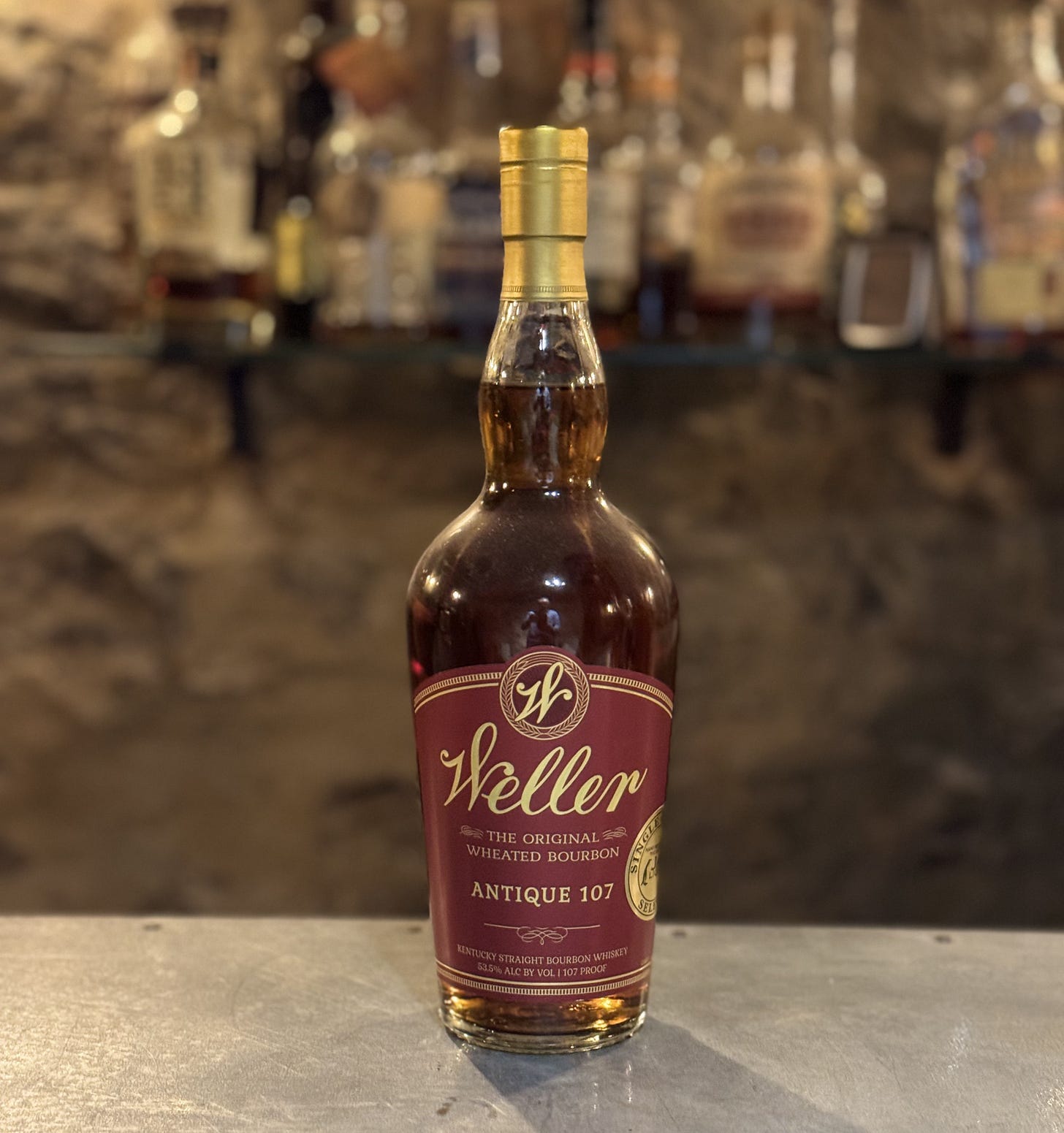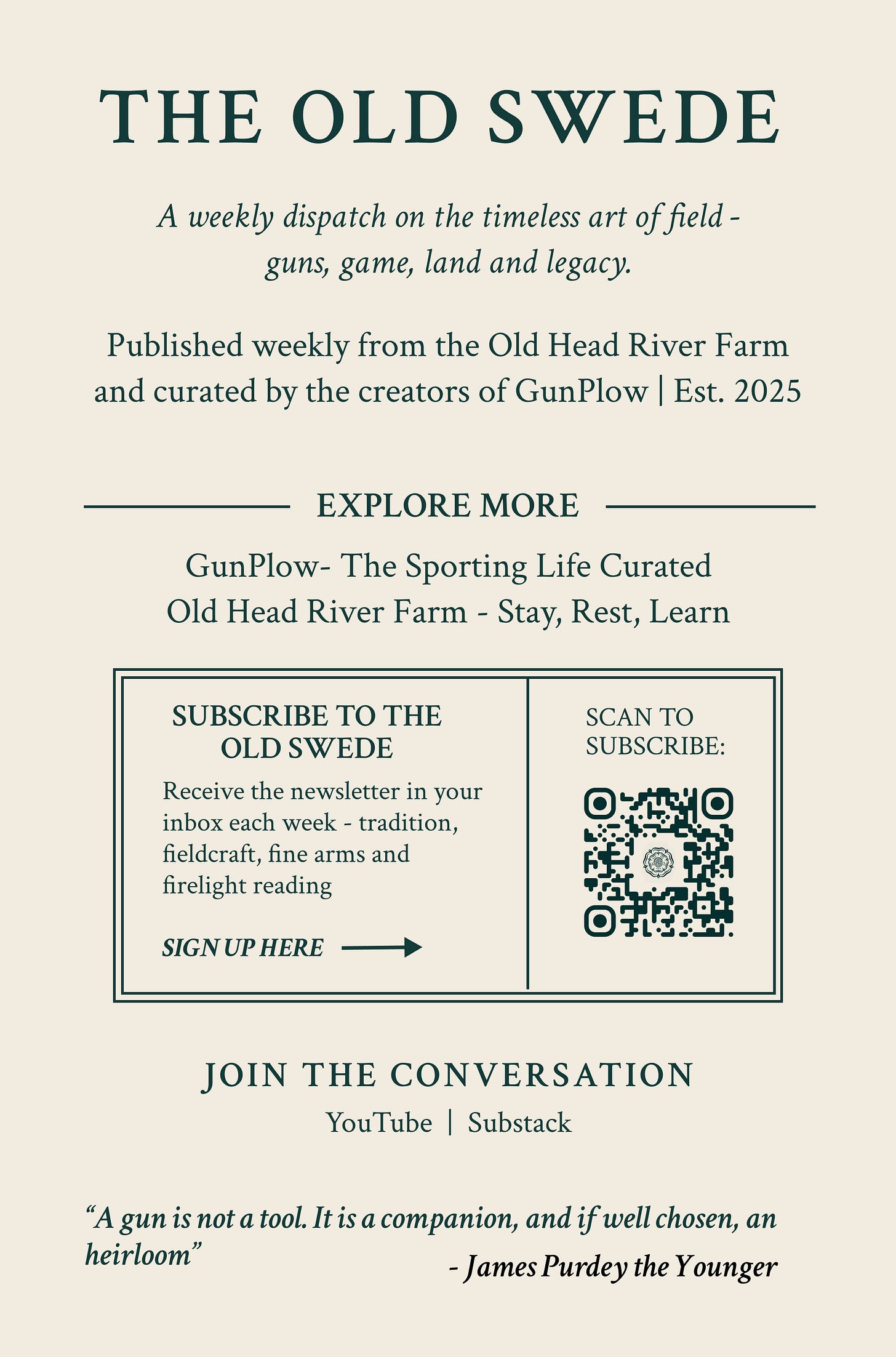The Old Swede: August 27th, 2025
Gentleman in the Field: A Life Measured in Miles Walked, Dogs Led, and Meals Earned
Upland Hunting
Grouse Camp in the North Woods
In the northern forests of Minnesota and Wisconsin, grouse camp is more than a place—it’s a rite. The cabins are simple: wood stoves, hand-carved pegs for hanging gear, and porches where dogs rest with their noses in the wind. The men who gather there come not just for birds, but for the rhythm of bootsteps through alder and aspen.
Days begin with thermoses of black coffee and dogs quivering in their crates. The woods hum with anticipation. Shots echo, distant and irregular, followed by silence—or cheers. Grouse are elusive. The cover is tight. The reward isn’t in numbers but in moments: the bell that stops mid-step, the flush that catches your breath, the shot that connects.
In the evening, stories stretch longer than shadows. Game is cleaned by headlamp, and bourbon flows while someone sharpens a knife by firelight. There’s always a camp journal. There’s always a toast to the old dog who hunted his last season. And there’s always next year, marked on the calendar before you leave.
Grouse camp isn’t a retreat—it’s a return. To something primal, enduring, and good.
Recommended Reading:
Grouse Feathers by Burton Spiller; A Hunter’s Fireside Book by Gene Hill
Manners Maketh Man
The Perfect Lodge Guest
To be a fine shot is admirable. To be a welcomed return guest at a shooting lodge is higher praise. The perfect lodge guest arrives with humility, offers help before it’s asked, and carries himself with quiet respect for both people and place.
He knows that hospitality is a gift, not a transaction. He leaves muddy boots by the door and makes the bed even if housekeeping is provided. He praises the cook, offers to pour wine, and never tells a story to “one up someone else”
When dogs come in from the field, he kneels to praise them. When dog handlers and guides speak, he listens. He tips generously and discreetly, writes a thank-you letter before he unpacks at home, and recommends the lodge by name, but never flaunts it.
He packs light but brings extras—shells, a flask, gloves to share. He shares credit for a good day afield, and if he shoots poorly, he takes it in stride.
Lodges remember the guests. But they re-invite the reserved gentlemen. Be the man whose presence improves the room, whose stories include others, and whose absence is noted when the season begins again.
Kit Review
Briar-Proof Chaps
A good pair of briar-proof chaps is a must have for serious upland hunters. From Appalachian hollows to Midwest thickets, the cover is unforgiving, and so are the thorns. Waxed canvas or heavy duty nylon duck cloth are preferred materials, offering both abrasion resistance and breathability.
The ideal pair buckles above the boot and below the belt, stays put without twisting, and sheds burrs instead of collecting them. Quilted fronts or reinforced knees are a plus. Filson, Dan’s, and WingWorks make trusted versions.
They're not flashy. They're armor—allowing you to stride through bramble with confidence, knowing your legs won't pay the price for a tight-sitting bird.
Recommended Gear:
Bourbon & Cigars
Weller Antique 107
A favorite among bourbon aficionados and bird hunters alike, Weller Antique 107 is a wheated bourbon with backbone. Produced by Buffalo Trace and often called the "poor man’s Pappy," it stands on its own with grace.
At 107 proof, it’s bold but balanced. Expect a nose of cherry, baking spice, and oak. On the palate: vanilla, leather, cinnamon, and a hint of pipe tobacco. It finishes warm, with just enough sweetness to linger into the next story.
In the field lodge, Weller Antique pairs well with a grilled teal breast or venison stew. Around the fire, it belongs in a thick-bottomed glass, poured slow and shared with the friend who let you borrow his dog.
Harder to find these days, yes. But worth it. Like a covey rise—rare, memorable, and over too soon.
Reference:
Buffalo Trace Distillery Notes; Bourbon Curious by Fred Minnick
Pub Spotlight
The Old Bars of the Northeast
From upstate New York to the shores of Maine, the Northeast hides some of America’s best old sporting bars. These aren’t polished gastropubs—they're places with floorboards worn thin, booths carved with initials, and beer served in heavy glass mugs.
In Vermont, the Three Penny Taproom in Montpelier has become a refuge for hunters fresh from woodcock coverts. In the Adirondacks, The Deer’s Head Inn serves bourbon beside elk steaks and stories from the Saranac Range. And in Maine, The Liberal Cup in Hallowell still pours brown ale for men in Filson vests and bean boots.
What they share: a sense of unchanging comfort. Menus with liver and onions. Bartenders who pour without asking. A dog bowl by the hearth. These bars don’t post “sportsmen welcome.” They don’t have to. You’ll know when you walk in.
Recommended Stops:
The Deer’s Head Inn (Elizabethtown, NY)
The Liberal Cup (Hallowell, ME)
Three Penny Taproom (Montpelier, VT)
Upland Adventures
The Grouse Lodge at Little Moran
ucked into the aspen edges and popple cuts of central Minnesota, The Grouse Lodge at Little Moran is a throwback to when upland hunting was more about dogs and less about hashtags. Here, the days begin with dog bells and end with cast iron suppers, and the only schedule is set by scent and wind.
Owned and operated by veteran guide and seaoned dog trainer, Steve Grossman, the lodge offers guided ruffed grouse and woodcock hunts across thousands of managed acres. Their string of English setters and pointers is as strong as any in the Great Lakes region—steady to flush, honest to retrieve, and handled with quiet professionalism.
The lodge itself is warm, rustic, and proper. Walls are adorned with vintage double guns and old bird covers from Gray’s. The food is honest—wild game, stew, bread—and the stories last long into the night.
For the wingshooter who values real cover and real dogs, Little Moran delivers.
Click here to read more.
Reference:
Quote from the GunPlow Library
"There are mornings when the dog’s bell is the only sound I want to hear, and I’d gladly trade a limit of birds for one more hour in the cover with him."
— Gene Hill, A Shotgunner’s Notebook
GunPlow Classic Library Coming Soon







